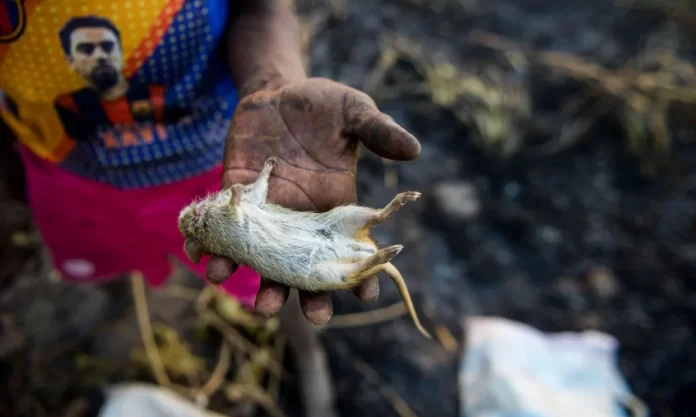Clinical trials for the first new treatment for Lassa fever in almost 40 years are planned to be held in Nigeria this year.
The neglected tropical disease kills about 5,000 people a year and is endemic in west Africa.
The trials will begin in September at the Federal Medical Centre, Owo (FMCO), in Ondo state, which has high rates of the rodent-carried virus. It is the first work on a new treatment since ribavirin was approved for use in 1986. The drug’s efficacy has recently been questioned.
Dr Femi Ayodeji, FMCO’s head of infection control and research, said: “It’s important to get new treatments to avoid severe cases. By having new drugs that treat the Lassa fever virus better, the need for supportive treatments for some patients who develop acute kidney injury, and cardiovascular respiratory complications, will be reduced.”
Lassa fever is designated an epidemic threat to global health and a priority for research by the World Health Organization. Between 300,000 and 500,000 cases are recorded annually in west Africa. The fatality rate is about 1%, but that rises to 15% among people hospitalised with severe cases. Symptoms include fever, coughing, vomiting and diarrhoea, and it can affect the liver, spleen and kidneys.
The Nigeria Centre for Disease Control and Prevention (NCDC) has recorded 6,226 suspected cases and 160 deaths so far this year. More than 60% of these cases are in Ondo, Edo and Bauchi states.
Dr Manir Jega, the director of health at the Nigerian Red Cross Society, said the figures are a cause for serious concern because some states are “ill-equipped to handle an outbreak”.
The trials are being conducted by the Integrate consortium of 15 leading research institutes, health centres and humanitarian organisations from 10 countries, which will test the efficacy of new and existing drugs currently used to treat other diseases.
Dr Marie Jaspard, an infectious disease specialist at Saint-Antoine hospital in Paris, and clinical researcher for the French institute Inserm, who is involved in the trials, said: “We will evaluate several other projects [drugs] against ribavirin … The interest of this trial is that we can remove some treatment arms that are not working and add new treatments. We will not waste time and patience with drugs that are not working.”
She said finding new ways to treat the virus were important as more deadly strains were emerging in the region, most recently in Benin, which recorded higher death rates.
Further trials are expected in Nigeria’s Ebonyi state and in Liberia and Guinea as part of the five-year Integrate project, funded by the European Union.
Related: What is the pandemic accord and why have negotiations been so difficult?
Opeyemi Onupona, 36, almost died from Lassa fever last year. She was rushed to FMCO, one of five Nigerian hospitals equipped to treat the disease. “I was scared that my husband and two children had contracted the disease too,” Onupona said. “But, fortunately for us, their test results were negative.”
FMCO, which receives funding from the NGO Alliance for International Medical Action (Alima), a member of the consortium, has a 40-bed isolation ward and a lab for quick diagnosis.
“We’ve managed over 2,000 cases since 2018 with a case fatality rate of less than 15. Our emergency outbreak centre is the first in the state, with case management and laboratory teams,” said Ayodeji.
Jaspard said the goal is to equip healthcare professionals with the skills and facilities to combat other viral diseases in the future.
“The very long-term goal is that we find drugs to combat several viruses like Ebola and Covid-19. The more we find solutions against viruses, such as diagnosis, treatments and vaccines, the more we’ll be prepared for the next outbreak.”
Read original article on Yahoo News



